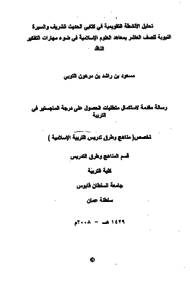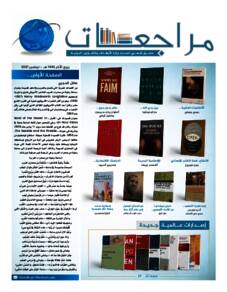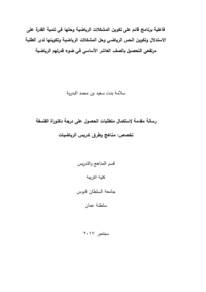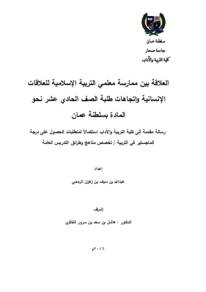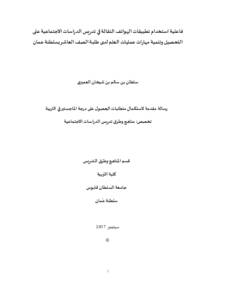Document
تحليل الأنشطة التقويمية في كتابي الحديث الشريف والسيرة النبوية للصف العاشر بمعاهد العلوم الإسلامية في ضوء مهارات التفكير الناقد.
Publisher
جامعة السلطان قابوس
Gregorian
2008
Language
Arabic
English abstract
This study aims at finding out to what extent the skills of critical thinking are employed in the assessment activities of the curricula of "Hadith" and "Seerah" assigned for grade ten at the Institutes of Islamic Sciences. In order to achieve the aim of the study, the researcher organized a list of the main skills of critical thinking (deduction, induction and evaluation) to assess their trueness. Also, the researcher prepared a criterion to evaluate to what extent the skills of critical thinking mentioned above are included in the curricula of "Hadith" and "Seerah". This assessment was done with assistance of some specialists from SQU, Ministry of Education, Sultan Qaboos Center for Islamic Culture and the Institute of Islamic sciences. The study sample included (174) assessment activities from the curriculum of "Hadith" and (165) activities from the curriculum of "Seerah". All these activities are found in the Curricula assigned for grade ten at the Institutes of Islamic Sciences (2006-2007). Then, the found activities were analyzed in the light of the skills of critical thinking (deduction, induction and evaluation) and the head question was considered the analysis unit. The main findings the researcher came up with are as the following: - The evaluative activities of "Hadith" and "Seerah" curricula included all the skills of critical thinking (deduction, induction and evaluation) but induction came in the first position in terms of frequency, then deduction and finally evaluation. - The evaluative activities found in the curriculum of "Hadith" included = more skills of critical thinking than the activities of "Seerah" curriculum. Based on these findings, the researcher recommends that all skills of critical thinking have to be included equally according to pedagogically specified percentages.
Member of
Resource URL
Arabic abstract
هدفت هذه الدراسة الكشف عن مدى تضمن أنشطة كتابي الحديث الشريف والسيرة النبوية بالصف العاشر بمعاهد العلوم الإسلامية المهارات التفكير الناقد، ولتحقيق هذا الهدف قام الباحث بإعداد قائمة تتضمن المهارات الرئيسة للتفكير الناقد (الاستقراء، والاستنباط، والتقويم)، وعرضها على مجموعة من الأساتذة المحكمين؛ للتأكد من صدقها، إضافة إلى إعداد معیار الحكم على مدى تضمن أنشطة كتابي الحديث الشريف والسيرة النبوية المهارات التفكير الناقد، وذلك بالرجوع إلى أهل الاختصاص من جامعة السلطان قابوس، ومعهد العلوم الشرعية، ووزارة التربية والتعليم، ومركز السلطان قابوس للثقافة الإسلامية.
وقد تكونت عينة الدراسة من أنشطة كتابي الحديث الشريف والسيرة النبوية، المقررین علی طلبة الصف العاشر بمعاهد العلوم الإسلامية للعام الدراسي ۱۹۲۷ ه/ ۱۹۲۸ ه - ۲۰۰۹م / ۲۰۰۷م، إذ بلغ عدد الأنشطة في كتاب الحديث الشريف (۱۷۶) نشاطا، بينما بلغ عددها في كتاب السيرة (165) نشاطا. تم تحليل أنشطة الكتابين في ضوء مهارات التفكير الناقد الثلاث الاستقراء، والاستنباط، والتقويم)، وكان السؤال هو وحدة التحليل.
ومن أبرز النتائج التي توصلت إليها الدراسة: - تضمن أنشطة كتابي الحديث الشريف والسيرة النبوية المهارات التفكير الناقد الثلاث ( الاستقراء، والاستنباط، والتقويم ) حيث جاءت مهارة الاستنباط في المرتبة الأولى تلتها مهارة الاستقراء، ثم مهارة التقويم. - تضمن أنشطة مقرر الحديث الشريف لمهارات التفكير الناقد كان بنسبة أكبر من مقرر السيرة النبوية. وفي ضوء النتائج التي توصل إليها الباحث أوصى بضرورة تضمين جميع مهارات التفكير الناقد التي توصل إليها الباحث وبنسب محددة تربويا.
وقد تكونت عينة الدراسة من أنشطة كتابي الحديث الشريف والسيرة النبوية، المقررین علی طلبة الصف العاشر بمعاهد العلوم الإسلامية للعام الدراسي ۱۹۲۷ ه/ ۱۹۲۸ ه - ۲۰۰۹م / ۲۰۰۷م، إذ بلغ عدد الأنشطة في كتاب الحديث الشريف (۱۷۶) نشاطا، بينما بلغ عددها في كتاب السيرة (165) نشاطا. تم تحليل أنشطة الكتابين في ضوء مهارات التفكير الناقد الثلاث الاستقراء، والاستنباط، والتقويم)، وكان السؤال هو وحدة التحليل.
ومن أبرز النتائج التي توصلت إليها الدراسة: - تضمن أنشطة كتابي الحديث الشريف والسيرة النبوية المهارات التفكير الناقد الثلاث ( الاستقراء، والاستنباط، والتقويم ) حيث جاءت مهارة الاستنباط في المرتبة الأولى تلتها مهارة الاستقراء، ثم مهارة التقويم. - تضمن أنشطة مقرر الحديث الشريف لمهارات التفكير الناقد كان بنسبة أكبر من مقرر السيرة النبوية. وفي ضوء النتائج التي توصل إليها الباحث أوصى بضرورة تضمين جميع مهارات التفكير الناقد التي توصل إليها الباحث وبنسب محددة تربويا.
Category
Theses and Dissertations

